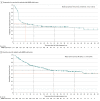Conflict of Interest Disclosures: Dr André reported receiving personal fees from Astellas, AstraZeneca, Aptitude Health, Bristol-Myers Squibb, Gritstone Oncology, GamaMabs Pharma SA, Gilead, GSK, Merck & Co Inc, Nordic Oncology, Pierre Fabre, Transgène, Servier, Seagen, Sanofi, Merck Serono, Amgen, and Roche/Ventana and receiving support for meetings from Bristol-Myers Squib, Merck & Co Inc and Servier outside the submitted work. Dr Curigliano reported receiving personal fees from Bristol-Myers Squibb, Ellipsis, Seattle Genetics, Roche, Novartis, Pfizer, Eli Lilly and Co, AstraZeneca, Daichii Sankyo, and Gilead during the conduct of the study. Dr Sabatier reported receiving personal fees from AstraZeneca, Eisai, Novartis, Roche, MSD, and GSK; nonfinancial support from AstraZeneca, Bristol-Myers Squibb, GSK, Pfizer, and Roche; grants from AstraZeneca, and grants to the institution from AstraZeneca and Eisai outside the submitted work. Dr Tinker reported receiving institutional grants from AstraZeneca and personal fees from GSK, Merck, Eisai, and AstraZeneca outside the submitted work. Dr Oaknin reported receiving personal fees from Agenus, AstraZeneca, Bristol-Myers Squibb, Clovis Oncology, Corcept Therapeutics, Deciphera Pharmaceuticals, Eisai, EMD Serono, F. Hoffmann-La Roche, Genmab, GSK, ImmunoGen, Itheos, MSD, Mersana Therapeutics, Novocure, OneXerna Therapeutics Inc, PharmaMar, Regeneron, Roche, Shattuck Labs, Seagen, and Sutro Biopharma and receiving institutional grants from AbbVie Deutschland, Ability Pharmaceuticals, Advaxis Inc, Aeterna Zentaris, Amgen, Aprea Therapeutics, Clovis Oncology, Eisai, F. Hoffmann-La Roche, GSK, ImmunoGen, Merck Sharp & Dohme de Espana, Millennium Pharmaceuticals, PharmaMar, and Regeneron Pharmaceuticals outside the submitted work. Dr Ellard reported owning stock in GSK outside the submitted work. Dr de Braud reported receiving personal fees from EMD Serono, Manarini, Novartis, MSD, Bristol-Myers Squibb, Incyte, Roche, Nerviano Medical Science, and Sanofi; receiving speakers bureau fees from AccMed, Amgen, Bristol-Myers Squibb, Healthcare Research & Pharmacoepidemiology, Incyte, Merck Group, MSD, Nadirex, Pfizer, Roche, Sanofi, and Servier; and receiving principal investigator fees from Basilea Pharmaceutica, Bristol-Myers Squibb, Exelixis, Daiichi Sankyo Development Limited, F. Hoffmann-LaRoche, Ignyta Operating, Janssen-Cilag International, Kymab, Loxo Oncology Inc, MedImmune, Merck KGAA, Merck Sharp & Dohme SpA, MSD, Novartis, Pfizer, and Tesaro outside the submitted work. Dr Trigo reported receiving institutional grants from AstraZeneca and MSD and receiving personal fees from Bristol-Myers Squibb, AstraZeneca, Boehringer, Takeda, MSD, and GSK during the conduct of the study. Dr Gravina reported receiving grants from Tesaro/GSK during the conduct of the study; receiving nonfinancial support from Pfizer; receiving grants from Janssen, AstraZeneca, Daiichi-Sankyo, Incyte, Exelixis, MSD, Pfizer, Roche, Bayer, Boehringer-Ingheleim, Hifibio, Merck, Sutro, and Taiho outside the submitted work. Dr Kristeleit reported receiving grants from Clovis Oncology and MSD; personal fees from GSK, Clovis Oncology, Tubulis, Merck, Celcuity, Leucid Bio, Duke St Bio, Seattle Genetics, Eisai, Basilea, Shattuck Labs, iTEOS, Incyte, Regeneron, AstraZeneca, PharmaMar, and MSD outside the submitted work. Dr Moreno reported receiving personal fees from Bristol-Myers Squibb, Bayer, Roche, Basilea, Janssen, Nanobiotix, Pieris, Regeneron/Sanofi, AstraZeneca, and Affimed outside the submitted work and receiving institutional funding from AbbVie, AceaBio, Adaptimmune, ADC Therapeutics, Aduro, Agenus, Amcure, Amgen, Astellas, AstraZeneca, Bayer, Beigene, BioInvent International, BMS, Boehringer, Celgene, Daichii Sankyo, Debiopharm, Eisai, e-Therapeutics, Exelisis, Forma Therapeutics, Genmab, GSK, Harpoon, Hutchison, Immutep, Incyte, Inovio, Iovance, Janssen, Kyowa Kirin, Eli Lilly and Co, Loxo Oncology Inc, MedSir, Menarini, Merck, Merus, Millennium, MSD, Nanobiotix, Nektar, Novartis, Odonate Therapeutics, Pfizer, PharmaMar, Principia, PsiOxus, Puma, Regeneron, Rigontec, Roche, Sanofi, Sierra Oncology, Synthon, Taiho, Takeda, Tesaro, Transgene, Turning Point Therapeutics, and Upshersmith outside the submitted work. Dr Abdeddaim reported receiving grants from MSD, GSK, Clovis Oncology, and AstraZeneca and receiving personal fees from AstraZeneca, Clovis Oncology, Merck, and GSK outside the submitted work. Dr Vano reported receiving personal fees from Bristol-Meyers Squibb, Janssen, Merck, Novartis, Roche, Sanofi, Viatris, Pfizer, MSD, Ipsen, and Eisai outside the submitted work. Dr Samouëlian reported receiving personal fees from Merck. Dr Miller reported receiving consultant fees from AZD, Clovis Oncology, Ellipses, GSK, MSD, and Shionogi; speakers’ bureau fees from AZD, Clovis Oncology, GSK, and Roche; travel grants from AZD and GSK; and trial funding from MSD. Dr Boni reported receiving institutional grants from AbbVie, ACEO, Adaptaimmune, Alkermes, Amcure, Amgen, Array BioPharma, AstraZeneca, Bristol-Myers Squibb, Bayer, BioNTech, CytomX, Genmab, Roche/Genentech, GSK, Genentech/Roche, H3, Incyte, Janssen, Kura, Eli Lilly and Co, Loxo Oncology Inc, Nektar, Macrogenics, Menarini, Merck, Merus, Nanobiotix, Novartis, Pfizer, PharmaMar, Principia, Puma, Sanofi, Taiho, Tesaro, BeiGene, Transgene, Takeda, Innovio, MSD, PsiOxus, Seattle Genetics, Mersana, Daiichi, Astellas, Orca, Boston Therapeutics, Dynavax, DebioPharm, Boehringer Ingelheim, Regeneron, Millennium, Synthon, Spectrum, Rigontec, and Zenith; receiving personal fees from Puma Biotechnology, Ideaya Biosciences, Loxo Oncology Inc, START, CytomX Therapeutics, Guidepoint, OncoArt, Eli Lilly and Co, Janssen, NEX Oncology, and QuironSAlud, outside the submitted work. Dr Anton Torres reported personal fees from AstraZeneca-Daichii-Sanykio and personal fees from Pfizer during the conduct of the study, personal fees from Lilly and personal fees from Gilead outside the submitted work. Dr Gilbert reported receiving personal fees from Alkermes, AstraZeneca, Eisai-Merck, GSK, Merck, Eisai, Novovure, and Kora Health; receiving grants Pfizer, Merck Sharp & Dohme, Karyopharm, Tesaro, Alkermes, AstraZeneca, Clovis, IMV, ImmunoGen, Roche, Mersana, Esperas, Novovure, Oncoquest, K-Group Beta, and GSK outside the submitted work. Dr Brown reported serving on the research steering committee for Genentech, receiving research support from Caris Life Sciences, receiving personal fees from AstraZeneca, Verastem, Clovis, Eisai, and GSK/Tesaro outside the submitted work. Drs Dewal, Dabrowski, Antony, and Zografos reported being employees of GSK during the conduct of the study. Dr Veneris reported receiving personal fees from GSK during the conduct of the study and outside the submitted work. Dr Banerjee reported receiving funding from The Royal Marsden NHS Foundation Trust during the conduct of the study and receiving grants from AstraZeneca and GSK; receiving personal fees from Amgen, Clovis Oncology, GenMab, Merck Serono, GSK, AstraZeneca, Immunogen, MSD, Mersana, Novartis, OncXerna, Seagen, Shattuck Labs, Regeneron, Epsilogen, Novacure, Takeda, Roche, Pfizer, and Verastem outside the submitted work. No other disclosures were reported.



